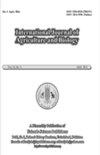{"title":"Direct Shoot Organogenesis and Clonal Fidelity Confirmation of Tongkat Ali (Eurycoma longifolia) using Molecular Markers","authors":"Annor Gebril Annour Alttaher","doi":"10.17957/ijab/15.1802","DOIUrl":null,"url":null,"abstract":"Eurycoma longifolia is a medicinally potent plant found in the tropical forest of South-East Asia. Every part of the plant, especially the root is traditionally used as an aphrodisiac, anticancer and anti-inflammatory. E. longifolia is conventionally propagated by seeds but with low germination rate and efficiency. This has made an in vitro propagation of E. longifolia a desirable alternative. Hence, this study reports an effective method of direct organogenesis of shoot. In vitro seedling’s leaves were cultured on Murashige and Skoog (MS) medium containing 1.0 mg L-1 6-benzylaminopurine (BAP), producing 1.8 ± 0.5 shoots per leaf with a regeneration frequency of 68.2%. The shoot buds were directly formed from leaves without intermediate callus formation. To obtain complete plantlets, the shoots were in vitro rooted with an average number of 4.2 ± 0.4 roots per shoot in half-strength MS (½MS) medium supplemented with 0.5 mg L-1 indole-3-butyric acid (IBA). Regenerated plantlets were successfully acclimatized to field conditions with an 85% survival rate. Genetic fidelity of the micropropagated plantlets was evaluated using Simple Sequence Repeat (SSR) and Inter Simple Sequence Repeat (ISSR) analysis. The results showed that the monomorphic banding patterns of in vitro raised plantlets and their mother plant were similar, confirming its homogeneity and the reliability of the multiplication system. © 2021 Friends Science Publishers","PeriodicalId":13769,"journal":{"name":"International Journal of Agriculture and Biology","volume":" ","pages":""},"PeriodicalIF":0.0000,"publicationDate":"2021-07-01","publicationTypes":"Journal Article","fieldsOfStudy":null,"isOpenAccess":false,"openAccessPdf":"","citationCount":"0","resultStr":null,"platform":"Semanticscholar","paperid":null,"PeriodicalName":"International Journal of Agriculture and Biology","FirstCategoryId":"1085","ListUrlMain":"https://doi.org/10.17957/ijab/15.1802","RegionNum":0,"RegionCategory":null,"ArticlePicture":[],"TitleCN":null,"AbstractTextCN":null,"PMCID":null,"EPubDate":"","PubModel":"","JCR":"Q2","JCRName":"Agricultural and Biological Sciences","Score":null,"Total":0}
引用次数: 0
利用分子标记直接鉴定长叶桐芽器官发生及克隆保真度
长叶Eurycoma longifolia是一种在东南亚热带森林中发现的药用植物。植物的每一部分,尤其是根部,传统上都被用作春药、抗癌和抗炎药。长叶E.longifolia通常通过种子繁殖,但发芽率和效率较低。这使得长叶E.longifolia的体外繁殖成为一种理想的选择。因此,本研究报道了一种有效的芽器官直接发生的方法。在含有1.0mg L-1 6-苄基氨基嘌呤(BAP)的Murashige和Skoog(MS)培养基上培养幼苗叶片,每片叶片产生1.8±0.5芽,再生频率为68.2%。为了获得完整的植株,在添加了0.5 mg L-1吲哚-3-丁酸(IBA)的半强度MS(½MS)培养基中,以平均每个芽4.2±0.4根的数量对芽进行离体生根。再生植株成功适应田间条件,成活率达85%。利用简单序列重复序列(SSR)和ISSR分析对微繁殖植株的遗传保真度进行了评价。结果表明,试管苗与母株的单形态条带模式相似,证实了其同质性和增殖系统的可靠性。©2021 Friends Science出版社
本文章由计算机程序翻译,如有差异,请以英文原文为准。


